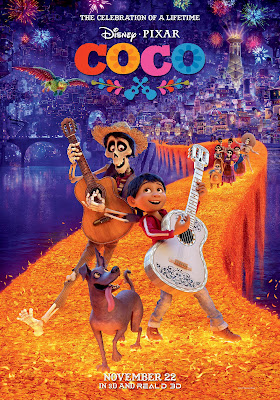When Pixar first set out to make Toy Story in the early-1990s, one of their goals was to not make a musical. Twenty-two years later, they ended up going that route--but in an unconventional way--with the fantasy-adventure Coco.
This spiritual and emotional journey (courtesy directors Lee Unkrich and Adrian Molina) is set during the indigenous holiday known as "Dia de Los Muertos" (or, Day of the Dead), where a young boy named Miguel plays and loves music, despite his family's outright detesting of it. He eventually meets his ancestors when he inadvertently ends up in the Land of the Dead. He also meets a charismatic trickster named Hector, before journeying to meet his music hero, the famous Ernesto de la Cruz, who may or may not be his great-great-grandfather.
Sure, this vibrant, dazzling, and colorful story features original songs (one by Frozen songwriters Kristen Anderson-Lopez and Robert Lopez) inspired by the country of Mexico. But its characters (including the ambitious Miguel) perform them at venues and other related events throughout the film, resulting in a very grounded approach. (This is something the 2018 remake of A Star Is Born also did very well).
 |
| Miguel and Mama Coco |
Coco also represents a stepping stone for onscreen cultural representation, and not just for Pixar or animation in general. Its artistry is breathtaking (such as when Miguel first crosses the leaf bridge) and its character designs (particularly the unique skeleton forms in the Land of the Dead) are idiosyncratic. More importantly, the film is very respectful of Mexican culture, from its customs to its indigenous communities.
However, the film does step into murky waters with a paganistic and humanistic worldview and an idolized view on family, with no suggestion of a Higher Power--with the exception of one character making a cross signal. (One scene, in particular, suggests that, according to said worldview, once people in the afterlife are completely forgotten, they disappear forever. A depressing fact, indeed.) In addition, the humor, while witty, often plays on the macabre. With that in mind, Coco is not a film I recommend for younger children; parents will need to navigate some of its more mature and theological elements (including allusions to cancel culture).
On the other hand, the film does a few things right. As Cars 3 did, Coco illustrates the power of untold stories from people long-forgotten. Other themes include the pursuit of worldly success and the terrible cost involved, along with the hurt, anger, and even lack of forgiveness, that comes with it. The same goes for the danger of looking up to those who seem great but turn out to be the opposite (and vice versa). In the case of Miguel's family line, things go from the pursuit of happiness and self-worth to recognizing the importance of family and remembering (and forgiving) loved ones. Hence, the profound and endearing track "Remember Me" (especially when its true context is revealed, which you'll need a box of kleenex for). Now that's a life-affirming message worth remembering.





No comments:
Post a Comment